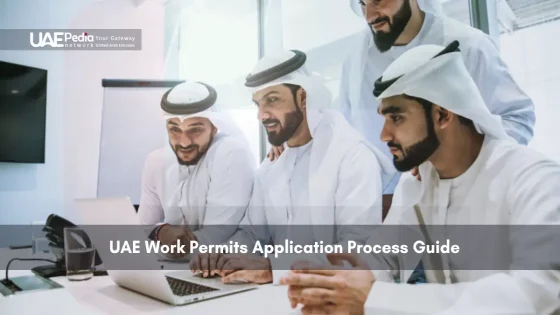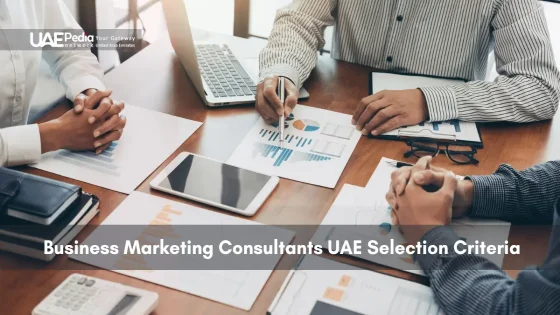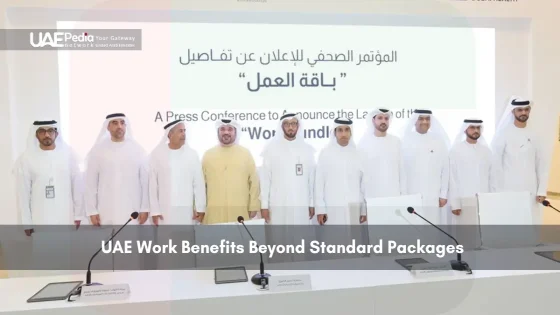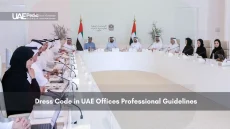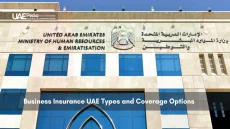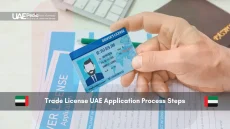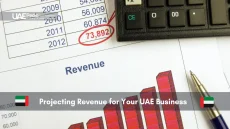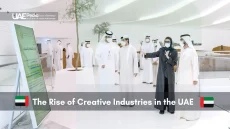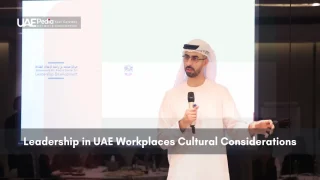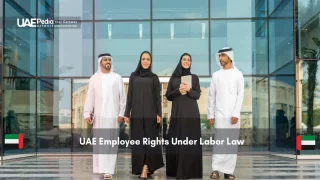Did you know 9 out of 10 people you’ll meet in Dubai hail from somewhere else? This desert metropolis thrives on international talent, offering golden-hour skylines and career opportunities as vast as the Empty Quarter. But here’s the secret: unlocking your place here starts with understanding one essential gateway – the employment authorization process.
Our experience spans assisting numerous professionals, from tech innovators to hospitality stars. Whether you’re eyeing a standard employment visa, the 10-year Golden option, or the sustainability-focused Green category, this guide breaks down each step like a trusted friend explaining directions to the Burj Khalifa.
You’ll discover:
- How entry permits and residency visas connect like desert dunes meeting city lights
- Why your employer acts as both sponsor and paperwork partner
- Documentation tricks that prevent delays (think attested diplomas and medical checks)
Prepare to navigate the streamlined processes with confidence, leveraging the latest digital tools and expert insights.. By the end, you’ll be ready to sip karak chai while handling applications like a true Dubai insider.
Navigating the UAE Work Permit Landscape in 2025
Imagine a city where over 8 million residents share one common thread – they all chose to build their futures here. This melting pot of talent didn’t happen by accident. Forward-thinking policies and simplified authorization processes transformed desert sands into global career oases.
Why Talent Flows Like Desert Winds
Three factors fuel this growth:
- Tax advantages that let professionals keep more of their earnings
- Cutting-edge industries from AI to renewable energy hungry for specialized skills
- A cultural mosaic where 200+ nationalities collaborate daily
The Ministry of Human Resources acts as the compass for this ecosystem. Their digital platforms streamline everything from contract approvals to accreditation checks – think of it as a bureaucratic magic carpet ride.
Win-Win Dynamics in Modern Hiring
Companies gain access to a pre-vetted international talent pool, while job seekers enjoy:
- 90-day grace periods between roles
- Clear pathways from entry permits to long-term residency
- Medical insurance bundled with employment packages
As one tech recruiter told us: “It’s like having the world’s résumé on your desk – without the paperwork nightmares.” Ready to see how these shifts could shape your career skyline?
Comparing UAE Visa Types: Employment, Golden, and Green Visas
Choosing your path here feels like standing at a desert crossroads – each route leads to different horizons. Let’s unpack three main authorization options that could shape your career journey.
Standard Employment Visa Essentials
The standard employment visa typically offers a 2-year validity, with recent updates allowing for more flexible durations based on employment contracts. Think of it as a professional tango – your company handles:
- Ministry of Human Resources approvals
- Medical screenings and labor contracts
- Renewal paperwork every few years
Perfect for those seeking stability, it’s the go-to for corporate roles. As Dubai recruiter Layla Al-Mansoori notes: “This visa builds careers like scaffolding – secure, but with clear boundaries.”
Golden and Green Visa Options Explained
The Golden Visa offers a 10-year sponsor-free residency for:
- Investors with a minimum of AED 2 million in UAE property, with the requirement that at least 50% of the property’s value is paid off if mortgaged.
- top graduates from accredited universities.
- specialists in priority sectors, and other exceptional talents.
Green Visa provides a 5-year self-sponsored residency for skilled employees, freelancers, and investors. Skilled employees must have a valid employment contract, be classified in the first, second, or third occupational level as per MoHRE, hold a minimum of bachelor’s degree or equivalent, and have a salary of not less than AED 15,000 per month.
The UAE’s Golden Visa program offers a 10-year residency to outstanding university graduates, particularly those in strategically important fields as defined by the government. Eligibility criteria include exceptional academic performance and graduation from top-ranked universities, either within the UAE or internationally. Ref.: “Which university and degree makes you eligible for UAE’s Golden Visa? The Economic Times.” [!]
“Picking your visa type is like choosing between a desert safari jeep or a yacht – both get you exploring, but the experience differs wildly.”
Eligibility Criteria and Essential Job Offer Requirements
Building your career here resembles crafting a sandcastle – you need the right foundation before adding towers. The authorization process begins with two non-negotiables: a formal job offer and a sponsoring employer. Let’s unpack how these elements interlock like traditional Arabic latticework.
Role of Employer Sponsorship
Companies act as your launchpad, handling 70% of the paperwork sprint. Their sponsorship isn’t just a formality – it’s a legal commitment ensuring:
- Valid labor contracts approved by the Ministry
- Compliance with local wage protection systems
- Medical insurance coverage as part of your package
One HR manager from a tech firm shared: “We verify everything from academic credentials to previous employment gaps – it’s like being a career detective with a checklist.”
| Document | Purpose | Tips |
|---|---|---|
| Passport copies | Identity verification | Ensure 6+ months validity |
| Attested diplomas | Education proof | Use authorized translation services |
| Offer letter | Employment terms | Include salary in local currency |
Smart applicants double-check their offer letters for clear start dates and position details. Pro tip: Request a digital preview of your labor contract before signing – it’s easier to fix typos early!
Employers can now complete initial approvals within seconds, thanks to a new AI-driven system introduced by MoHRE that eliminates bureaucracy and paperwork. But remember: Your dream role waits on the other side of this paperwork oasis. Ready to cross the dunes?
IMPLEMENTATION CONSTRAINT:
Employers must ensure that the commercial licenses match the applicant’s job offer, translate contracts into Arabic through accredited services, and upload necessary documents via the ‘Work Bundle’ platform. Failure to comply with these requirements can lead to application rejections or delays. Ref.: “Dubai Mainland vs Free Zone License 2025 | How to Choose. Emifast.” [!]
Step-by-Step Guide to the UAE Work Permit Application Process
Picture this process like assembling a perfect mezze platter – each ingredient matters, and timing is everything. Let’s transform what seems complex into bite-sized actions seasoned with insider know-how.
Your Roadmap to Authorization Success
- Employer Kickoff
Companies initiate the process through the ‘Work Bundle’ platform, which consolidates multiple services into a single application, reducing processing time to as little as 5 working days. - Document Tango
Gather your passport copies, attested diplomas, and passport-sized photos. Pro tip: Scan everything in color – bureaucracies love rainbow clarity. - Medical Waltz
Within 30 days of arrival, complete blood tests and chest X-rays. One nurse chuckled: “We’re faster than a falcon’s dive – results in 48 hours!” - ID Sprint
Apply for your Emirates ID within 14 days. Delays here? That’s like forgetting hummus at a dinner party – everything feels incomplete.
Common hiccups? Contract typos or expired passports. Partnering with local experts acts like GPS through sandstorms – they reroute delays before you’re stuck.
| Phase | Typical Timeline | Pro Move |
|---|---|---|
| Entry Permit | 5-7 days | Track status via SMS alerts |
| Medical | 2 days | Fast clinics near government hubs |
| Residency Stamp | 3 days | Book biometrics early |
Remember: Smooth transitions happen when you treat each step like gold leaf on kunafa – handle with care, and savor the sweet results.
Navigating Entry Permits and Emirates ID Procedures
Think of your entry permit as the first golden rays of a desert sunrise – it illuminates your path to settling in. This pink-hued authorization acts as your temporary key, granting 60 days to finalize residency for most applicants (or six luxurious months for Golden visa seekers).
Your Pink Visa Playbook
This initial document isn’t just paperwork – it’s your backstage pass. Three essentials to remember:
- Validity starts counting the moment you enter the country
- Medical checks and ID registration must happen within this window
- Extensions require jumping through bureaucratic hoops – better to sprint than stroll
“Treat your entry period like sunset at Burj Khalifa – every minute counts for that perfect transition,” advises Dubai visa consultant Amir Khaled.
Biometrics & Beyond: The ID Dance
Your Emirates ID now serves as the primary record of your residency status, with visa details electronically linked, eliminating the need for passport stamping. The registration shuffle goes like this:
- Book an appointment at approved typing centers
- Bring passport copies and entry permit (originals preferred)
- Complete fingerprint scans and facial recognition – smile for the future!
| Step | Deadline | Pro Tip |
|---|---|---|
| Entry Permit Activation | Day 1 | Photocopy all pages |
| Medical Screening | Within 30 days | Choose government-approved clinics |
| Emirates ID Application | Within 14 days | Check spelling thrice |
Miss a deadline? That’s like forgetting sunscreen at noon – painful consequences follow. For smooth sailing, consider navigating visa processes with local experts who know every shortcut.
Remember: Compliance isn’t red tape – it’s your golden thread through the labyrinth. Nail these steps, and you’ll be sipping karak tea with your ID in hand before the desert winds change direction.
Medical Screening, Labor Contract, and Health Insurance
Your journey here begins with three vital checkpoints – think of them as your career’s pulse, breath, and heartbeat. These steps ensure you’re ready to thrive in your new role while staying compliant with local regulations.
Mandatory Medical Checkup Protocols
Start at government-approved clinics like Prime Medical Centers or American Hospital affiliates. The process mirrors a well-choreographed dance:
- Blood tests for infectious diseases
- Chest X-rays for respiratory health
- Vision and general physical exams
“Results arrive faster than a camel sprint,” says nurse Fatima Al-Rashid. “Most clinics email reports within 48 hours.”
Your labor contract becomes legally binding once uploaded to the Ministry portal. Double-check these details:
| Contract Element | Why It Matters |
|---|---|
| Start date | Triggers insurance activation |
| Salary breakdown | Affects banking and housing options |
| Job title | Must match permit classification |
Health insurance requirements shift like desert sands between Emirates. Dubai mandates employer-provided coverage, while Abu Dhabi requires personal policies for dependents. Delays here? That’s like missing the last metro – penalties stack up quickly.
“Treat medical deadlines like Friday brunch reservations – book early, confirm twice,” advises HR specialist Omar Hassan.
Pro tip: Use the MOHRE app to track submissions. Sync calendar reminders with your employer’s PRO officer – teamwork makes the paperwork dream work!
Employer and Sponsor Responsibilities in Visa Applications
Navigating visa applications feels like solving a puzzle where every piece must click perfectly – and employers hold half the tiles. Sponsors act as paperwork architects, building the framework that turns aspirations into stamped approvals. Their role goes beyond signatures; it’s about precision and cultural fluency.
Ensuring Accurate Documentation
Employers are responsible for ensuring compliance by verifying commercial licenses, translating contracts into Arabic through accredited services, and uploading necessary documents via the ‘Work Bundle’ platform.
- Verifying commercial licenses match the applicant’s job offer
- Translating contracts into Arabic through accredited services
- Uploading digital copies to Ministry of Human Resources portals
One PRO officer shared: “Submitting documents is like serving Arabic coffee – present it correctly the first time, or you’ll be asked to brew again.” Common missteps include expired trade licenses or mismatched job titles. Fixing errors? That’s like untangling fairy lights post-sandstorm – possible, but painfully time-consuming.
| Pitfall | Consequence | Smart Fix |
|---|---|---|
| Missing attestation | Application rejection | Use Ministry-approved notaries |
| Outdated forms | Delayed processing | Bookmark official portals |
| Signature mismatches | Legal disputes | Cross-check all signatories |
Best practice? Treat digital folders like a desert survival kit – organized, accessible, and updated weekly. Sync with HR teams using shared drives, and always keep physical backups. Compliance isn’t just red tape; it’s the golden thread weaving through every successful application.
Free Zone vs. Mainland: Legal and Operational Differences
Picture two business worlds coexisting like futuristic skyscrapers beside traditional souks – that’s free zones versus mainland operations here. Each offers unique advantages, but choosing between them shapes everything from paperwork to talent strategies.
Why Many Choose Tax-Free Havens
Free zones offer benefits such as 100% foreign ownership, tax exemptions, and simplified visa allocations, making them attractive for startups and international businesses.
- Zero corporate taxes for up to 50 years
- Full ownership without local partners
- Simplified visa allocations (think one permit per 9m² office space in Dubai)
As tech founder Amina Rajput shares: “Setting up here felt like unlocking cheat codes – we hired global talent faster than ordering karak tea.” These zones particularly shine for digital nomads and startups craving agility.
| Feature | Free Zone | Mainland |
|---|---|---|
| Ownership | 100% foreign | 51% local partner |
| Visa Quotas | Linked to office size | Based on payroll |
| Client Base | Global + free zone | Entire country |
Mainland businesses access broader markets but navigate more regulations. Retail chains and service providers often prefer this route despite needing local sponsors. Compliance here resembles intricate henna designs – beautiful when done right, but requiring patience.
Hiring differs too. Free zones allow direct sponsorship of employees, while mainland companies typically use PRO services. Both paths attract top talent, but your choice affects onboarding speed and operational flexibility.
“Pick free zones for speed, mainland for reach – it’s like choosing between a dhow cruise and a desert rally,” advises business consultant Farid Al-Marzouqi.
Compiling Essential Documents for Compliance and Success
Assembling your paperwork feels like prepping for a treasure hunt – every item holds clues to unlocking your next career chapter. Let’s transform this crucial phase from overwhelming to organized, with checklists sharper than a Bedouin’s star navigation.
Your Golden Checklist
Start with these non-negotiables:
| Document | Purpose | Pro Tip |
|---|---|---|
| Original passport | Identity verification | 6+ months validity required |
| Entry permit copy | Legal arrival proof | Keep digital backups |
| Attested diplomas | Education validation | Use embassy-approved services |
| Employment contract | Role confirmation | Highlight start date & salary |
Seal of Approval
Document attestation involves notarization in the home country, authentication by the foreign affairs ministry, and finalization at the UAE embassy, ensuring legal validity.. Here’s how to steam through:
- Get documents notarized in your home country
- Authenticate through your foreign affairs ministry
- Finalize at the destination embassy
One HR manager notes: “Skipping attestation is like serving gahwa without dates – incomplete and slightly awkward.”
Beat deadlines by treating submissions like sunrise yoga – early and consistent. Track three key dates:
- Medical checks within 30 days of arrival
- Emirates ID application within 14 days
- Labor contract upload before probation ends
Need help? Bookmark this essential travel documents guide for quick reference. Remember: Organized files are your golden ticket – they turn bureaucratic mazes into straight-line sprints toward success.
Understanding UAE Work Permit Fees, Timelines, and Renewal Policies
Navigating authorization costs feels like haggling in a spice souk – every dirham counts, and timing impacts value. Let’s decode what your career journey requires beyond passport stamps and coffee-fueled paperwork nights.
As of 2025, the cost of an employment visa in the UAE ranges from AED 2,500 to AED 7,000 or more, depending on various factors such as company type and job role. Additional fees for medical tests, Emirates ID, and other administrative requirements may apply. Ref.: “Employment Visa Cost in UAE 2025: A Complete Breakdown. Global Business Setup.” [!]
“read also: Adaptability in UAE Workplaces Becomes Essential Skill“
Breaking Down the Dirham Details
Government fees for employment visas range from AED 2,500 to AED 7,000, depending on factors like company type and job role. For instance, standard employment visas cost approximately AED 1,800 – AED 4,500, while Green Visa fees range from AED 2,200 to AED 3,700.
| Authorization Type | Government Fees | Processing Time |
|---|---|---|
| Standard Employment | ~$300 | 14-28 days |
| Golden (10-year) | ~$1,800 | 21-35 days |
| Green (5-year) | ~$650 | 10-20 days |
Seasoned HR manager Nadia Qureshi notes: “Applications move faster than Friday traffic when companies submit error-free documents.” Delays often stem from:
- Expired passports (renew yours 6+ months early)
- Missing medical reports
- Weekend/holiday closures
Renewals should be initiated at least 30 days before expiration, with the ‘Work Bundle’ platform facilitating a streamlined renewal process. Standard options require full reprocessing every 2-3 years, while Golden visas auto-renew for a decade, with the ‘Work Bundle’ platform facilitating a streamlined renewal process. Standard options require full reprocessing every 2-3 years, while Golden visas auto-renew for a decade. Workers over 50 pay extra medical fees – plan accordingly.
“Treat renewals like car maintenance,” advises consultant Raj Patel. “Skip oil changes, expect breakdowns – same with paperwork deadlines.”
Smart companies budget 15% extra for unexpected costs. Employees? Keep digital copies of everything – your future self will thank you during midnight application sprints.
Tips for a Smooth UAE Work Permit Application Experience
Navigating the authorization process resembles crossing shifting sands – one misstep can leave you spinning. Seasoned professionals share their hard-won wisdom to help you glide through like a desert falcon catching thermal winds.
Applicants are advised to use embassy-approved translation services for attesting diplomas and other documents. Ensuring that all paperwork is accurately translated and attested can prevent delays and rejections in the visa application process. Ref.: “How to Apply for a UAE Work Visa in 2025: Step-by-Step Guide. The Immigration World.” [!]
“read also: Business Mentor UAE Finding the Right Advisor
Avoiding Common Pitfalls in Application Submission
Three out of five delays stem from preventable errors. Here’s how to sidestep the quicksand:
| Pitfall | Smart Solution | Pro Tip |
|---|---|---|
| Expired documents | Renew passports 6+ months early | Set calendar reminders for renewals |
| Missed attestations | Use embassy-approved translation services | Request digital previews |
| Quota limitations | Partner with EOR providers | Check company quotas upfront |
Global hiring manager Layla Nassar advises: “Treat every requirement like gold dust – handle carefully, store securely.” Her team reduced processing times by 40% using specialized immigration services for document verification.
Double-check labor contracts against Ministry requirements. Match job titles precisely – “Senior Marketing Executive” vs “Marketing Manager” can trigger rejections. For complex hiring needs, consider PRO services acting as your bureaucratic GPS.
Timelines matter more than camel racing. Submit medical reports within 30 days, and never wait until week’s end for portal uploads. One applicant learned the hard way: “I missed the Friday cutoff by 10 minutes – cost me a week’s delay!”
Read More:
Final Thoughts and Next Steps for Global Employment Success
Charting your course in a global career landscape requires more than a map—it demands a trusted compass. By understanding each phase of the authorization journey, businesses and professionals transform bureaucratic challenges into strategic advantages. Think of this guide as your North Star, illuminating pathways from initial paperwork to long-term residency benefits.
Companies and employers that master the step-by-step process unlock access to top-tier talent while ensuring compliance with local regulations. Employees gain clearer timelines, medical coverage, and benefits like planting roots in a dynamic business hub. It’s a win-win where meticulous planning meets cultural fluency.
Seasoned navigators recommend pairing detailed checklists with local expertise—like having a co-pilot who knows every shortcut through immigration protocols. Digital tools and vetted partners help avoid common pitfalls, turning potential delays into smooth transitions.
Strategic documentation isn’t just about ticking boxes—it’s about crafting a story that aligns your skills with the country’s vision. Properly attested diplomas and precise work contracts become your passport to seamless approvals.
Ready to take the next leap? Connect with compliance specialists who speak the language of global mobility, and explore resources that turn complex processes into confident strides. Your future in international work starts with one well-informed step forward.
The Golden Visa offers 5-10 years of renewable residency without employer sponsorship, ideal for investors, skilled professionals, and entrepreneurs. Standard employment visas are tied to specific jobs and require employer sponsorship, typically valid for 2-3 years.
Most entry permits (pink visas) process within 5-7 business days if documents are complete. Delays happen if medical checks or attestations are pending—always double-check requirements with your employer or free zone authority.
Yes, but you’ll need a No Objection Certificate (NOC) from your current sponsor. New labor laws allow smoother transitions, though some free zones have specific rules. Always confirm policies with your PRO or HR team first.
Absolutely. Freelancers must obtain a freelance permit through free zones like Dubai Media City or Abu Dhabi’s twofour54. These permits let you legally work with multiple clients without full employer sponsorship.
Educational certificates and marriage licenses (for family visas) commonly slip through cracks. These require attestation from home country authorities, UAE embassies, and the Ministry of Foreign Affairs—start this early to avoid last-minute scrambles.
Yes, except for under-18 dependents. Tests include HIV, tuberculosis, and hepatitis checks. Government clinics handle screenings, and results sync digitally with your application—no paper copies needed anymore!
Free zones offer 100% foreign ownership, tax exemptions, and faster license processing. Mainland companies can trade directly with local markets but require Emirati sponsorship. Your choice depends on target clients and operational flexibility needs.
You get a 30-day grace period to renew or adjust status. Overstaying incurs daily fines—AED 50 for the first week, AED 100/day afterward. Set calendar reminders 60 days before expiry to avoid penalties.
